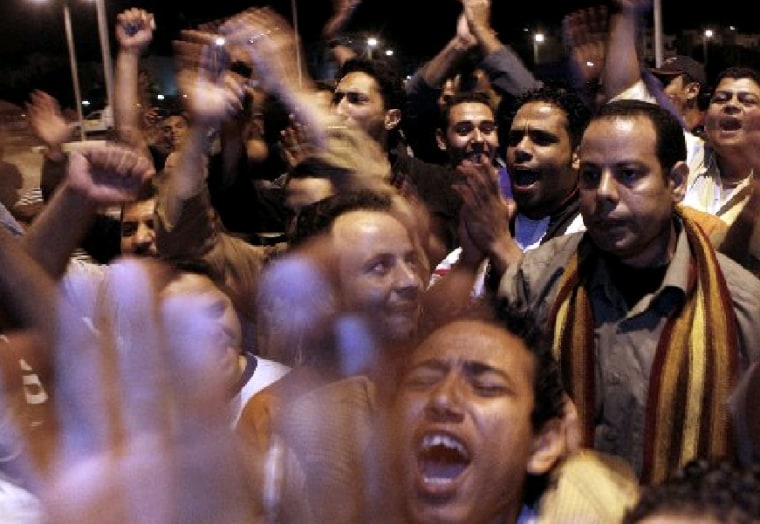Hosni Mubarak's health is "unstable," a medical source said Wednesday, after the former Egyptian president was detained for 15 days pending inquiries into accusations of corruption and abuse of authority.
Investigators are probing the killing of protesters during the unrest that led to Mubarak's ouster, embezzlement of public funds and abuse of power. He has denied any wrongdoing.
"Former President Hosni Mubarak remains in hospital here and his health is unstable," the source told Reuters from Sharm.
Mubarak's two sons, Gamal and Alaa, were also detained for questioning and taken to Cairo's Torah prison, where a string of former top regime figures — including the former prime minister, ruling party chief and Mubarak's chief of staff — are already languishing, facing similar investigations on corruption.
The move was brought on by enormous public pressure on the ruling military, which was handed power when Mubarak stepped down on Feb. 11.
Tens of thousands protested in Cairo's central Tahrir Square on Friday, the biggest rally in weeks, demanding Mubarak and his family be put on trial. Many in the crowd accused the military of protecting the former president.
The detention is a new landmark in the stunning fall of the 82-year-old Mubarak, who only months ago appeared unquestioned in his control of Egypt after nearly 30 years of rule.
Even after his fall, he seemed untouchable, living with his family at a palace in the Red Sea resort of Sharm el-Sheikh.
On Tuesday night, Mubarak was taken to a hospital in Sharm el-Sheikh because of heart troubles, and so that his health could be monitored as he submitted to the first round of questioning by investigators.
Hours later, the public prosecutor announced early Wednesday that Mubarak was ordered put under detention for 15 days for investigation.
He was to be flown later in the day to a military hospital outside Cairo, where he would remain in detention, a security official in Sharm el-Sheikh said, speaking on condition of anonymity because he was not authorized to talk to the press.
The detention also marks a new chapter in Egypt's still unsure transition to what protesters hope will be a democratic post-Mubarak future.
Protesters had pushed hard for Mubarak's prosecution, demanding what they called a clear signal that the corruption that pervaded his nearly 30-year rule would be definitively broken.
Public outrage was widespread over allegations that large fortunes were skimmed off by top regime officials through shady deals over the years.
'So happy'
Beyond the anger has been the fear that Mubarak cronies are maneuvering to regain power as the country tries to work out democratic rule — and that the ruling military was not taking action to prevent them, or was even abetting them.
"I was so happy in the morning when I heard the news," said Ahmed Maher, co-founder of the April 6 group, one of the movements that led the unprecedented 18-day protest movement against Mubarak.
"All people are very happy because this step reassured them after a period of doubts and stagnation," referring to doubts over the military's intentions, he told The Associated Press.
Worries over the military were intensified by a fierce pre-dawn raid on protesters in Tahrir on Saturday that killed at least one person.
Still, Maher said, Egypt faces a long road to ensure the transition period leads to real democracy.
"Trying Mubarak and his regime is very important but what is super important is the political future of Egypt and what kind of political system we want to have," he said.
The prosecutor's announcement gave a momentary easing of tensions between the military and protesters.
Following the prosecutor's announcement, the coalition of youth groups that have organized the protests said it was canceling a planned new mass demonstration in Tahrir Square on Friday to demand Mubarak's prosecution.
But the coalition underlined that there were still unfulfilled demands, including the dissolving of the former ruling party and the sacking of Mubarak-appointed governors as well as university deans and local city councils, both seen as levers of his regime.
Activist Amr Bassiouny said in a Tweet that the detention was not the protesters' primary goal but "free speech, free assembly, free press, no torture, real democracy, end of lies."
Since Mubarak's fall, activists have complained that the Armed Forces Supreme Council, the body of top generals that now rules Egypt, has been dictating the post-Mubarak transition without consultation.
Relations have rapidly soured over past week, amid reports of abuses by the military that reminded some of Mubarak's rule — including torture of detained protesters and the imprisoning of an activist for criticizing the army.
Protesters have criticized the army for being too close to the old regime and not swiftly bringing Mubarak to trial while hundreds of protesters remain in military detention, some convicted in swift trials before military courts.
In its announcement, posted on the social networking site Facebook, the public prosecutor said Mubarak was under investigation into allegations of assaults, killings and injury of protesters, corruption, squandering of public funds, and the abuse of authority for personal gain.
Hundreds were killed during the 18-day uprising against Mubarak, when police opened fire and cracked down on the crowds.
Officials say 365 were killed, but a count by the Front to Defend Egypt Protesters, a group that provides medical and legal assistance to the demonstrators, said 685 people died as of March 7.
